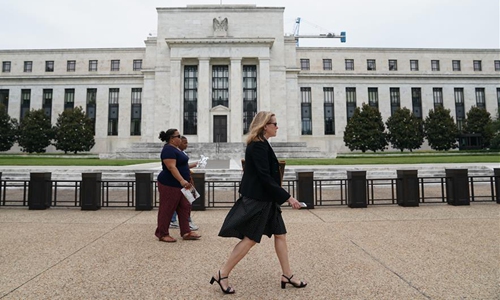HOME >> SOURCE
China needn't react to Fed's repo facility or dump US Treasury debt: analysts
By Zhang Hongpei and Zhang Dan Source:Global Times Published: 2020/4/6 20:23:40

People pass by the U.S. Federal Reserve building in Washington D.C., the United States, June 5, 2019. (Xinhua/Liu Jie)
With the Federal Reserve's Treasury repurchase program to support the financial markets becoming available on Monday, market observers are looking at the next move by China's central bank, as China is a major holder of US Treasury debt.
Analysts told the Global Times on Monday that it is not necessary for China to react to the Fed's repo plan nor dump US Treasury bonds.
In its latest move to respond to market strains caused by the COVID-19 pandemic, the Fed opened a temporary repo facility for foreign central banks, allowing the latter to exchange US Treasury debt for dollars, which can then be made available to institutions in their jurisdictions.
"This facility should help support the smooth functioning of the US Treasury market by providing an alternative temporary source of US dollars other than sales of securities on the open market," the Fed said in a statement on March 31.
It is of vital importance to stabilize the US Treasury market and prevent volatility, or the world's financial markets would be affected, an observer surnamed Li told the Global Times on Monday.
Hong Hao, managing director and head of research at BOCOM International, said that the Fed's new facility reflects strained liquidity in the global market for the US dollar.
Central banks around the world dumped US Treasury securities during March as the coronavirus took a toll on economies and market liquidity, driving up demand for the greenback. Smaller Asian nations and oil-focused economies primarily sold US debt, while foreign central banks' transactions were concentrated in older Treasury notes, according to reports by Bloomberg.
Foreign monetary institutions sold off more than $100 billion in Treasury notes in the three weeks ended March 25, according to Fed data.
Foreign entities hold about $6.86 trillion of US Treasury debt in total. Japan was the largest holder with $1.21 trillion, followed by China with $1.08 trillion in its reserves, data from the Department of the Treasury showed on March 16.
"China will not buy or sell US Treasury debt in the short term due to its steady macroeconomic and monetary policies," Dong Dengxin, director of the Finance and Securities Institute at Wuhan University, told the Global Times on Monday.
Compared with Europe, Dong said China's macroeconomic fundamentals and monetary policy are well-conducted and steady, so "there is no necessity to change its foreign exchange reserves… unless better alternatives appear."
"If profitable and safe monetary assets appear, we would consider lowering the asset portion of the US dollar," Dong said, noting that investment in the euro and yen by China had yet to emerge and the cost to reserve crude oil is also quite expensive.
"China's investment in foreign exchange reserves should be safe and profitable. For sure, safety comes first," Dong noted, adding that it is difficult to change the nation's current composition of foreign exchange reserves as the US debt accounts for about one-third of China's total reserves.
However, he hinted that China may increase its investment in sovereign wealth funds in future, as a part of the country's foreign exchange reserve assets.
Posted in: ECONOMY,BIZ FOCUS